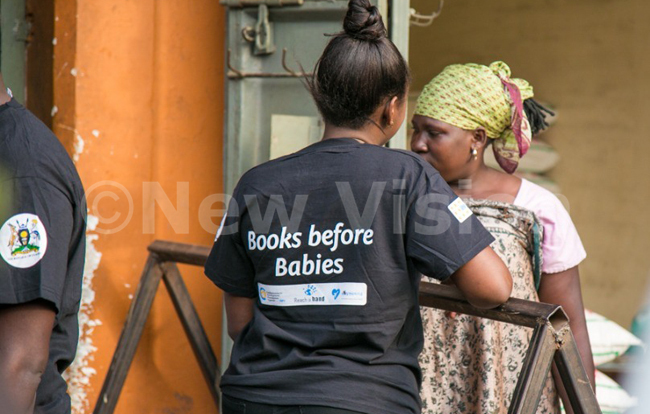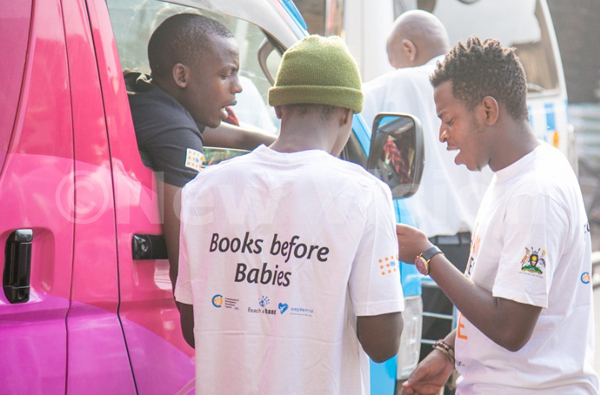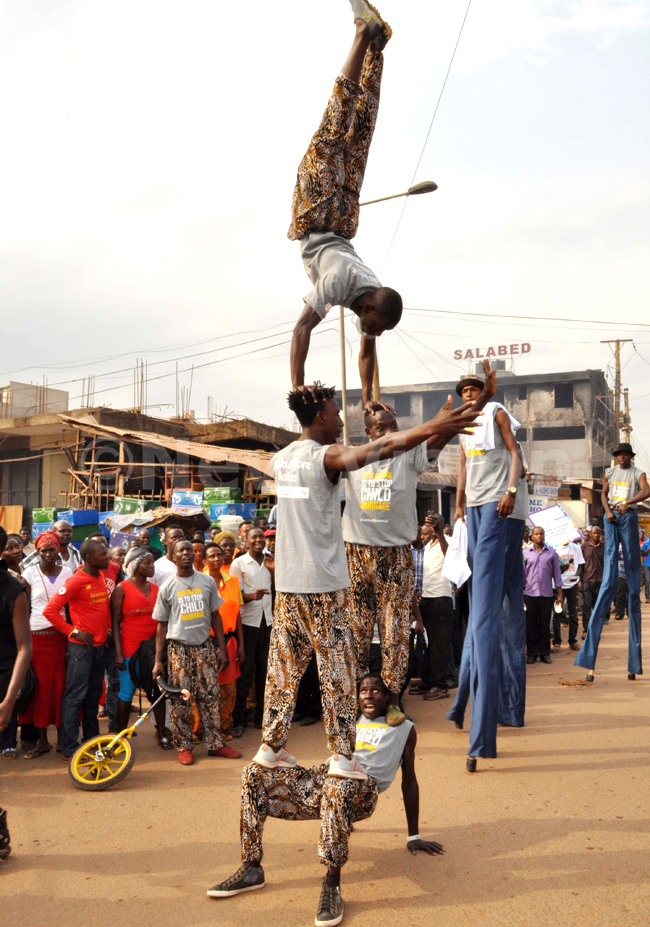Govt wages war on teenage pregnancies
While the teenage pregnancy rate declined from 31% in 2001 to 24% in 2011, it has gone up again to 25% as of 2016.
PIC: Girls displaying posters during the launch of a campaign by Reach a Hand against early marriages dubbed, Live your dream, in Kisenyi a Kampala surbub on Tuesday, February 06, 2018. (Credit: Shamim Saad)
GIRL-CHILD EMPOWERMENT
KAMPALA - Her childhood dream of becoming a medical doctor was cut short by a lie from a man she believed loved her.
The lie ruined her dream and today, Fiona Nakimuli, 22, is a food vendor in Kisenyi, a slum in Kampala.
While in Form Three, aged 16, Nakimuli fell in ‘love' with a fellow student and the two started having an intimidate relationship together.
"We had sex together only twice and the next thing I knew, I was pregnant. On those two occasions, I pleaded with him to use a condom, but he refused. He said I was so young to become pregnant," Nakimuli said
According to science, a woman can get pregnant and have a baby as soon as she begins ovulating and producing eggs, and this typically occurs about a year after they begin menstruating and some girls, this happens extremely early at the age of 11 and 12 and they can conceive.
Nakimuli recalls that while in school, he would give her what she asked for, including taking her out for lunch, giving her some money to use at school, but the day she broke the news of her pregnancy, he fled.
"When I told him I was carrying his baby, he denied being responsible, disappeared and I have never seen him again," she points out.
"Today, I am the mother and father of my daughter. I lost hope of ever seeing him again," she adds.

One of the activicists taking the campaign to traders in Kisenyi market in Kampala. (Credit: Shamim Saad)
Nakumuli's baby daddy is not the only one that abandoned her. She says the father was so upset with what happened to her, stopped paying her fees and told her to find her way.
Stranded with no one to turn to, Nakimuli began searching for casual work to enable her look after herself and the baby and that is how she ended up in Kisenyi vending food.
Nakumuli was sharing her story from Kisenyi on the day a new national campaign geared towards ending teenage pregnancy dubbed, Live your dream campaign was launched at Sheraton hotel recently.
The 8th country programme, which runs up to 2020, is being done by the Government (Ministry of Health) with other implementing partners, including the United Nations Population Fund (UNFPA) and Reach A Hand-Uganda (RAHU).
According to the country's 2011 demographic and healthy survey, teenage pregnancy has remained rampant and staggeringly high in the country.
Nearly a nearly a quarter of girls aged 15 to 19 have had a baby or are pregnant. Many drop out as a result; secondary school enrolment rates are lower among girls than boys.
While the teenage pregnancy rate declined from 31% in 2001 to 24% in 2011, it has gone up again to 25% as of 2016.
Young people, especially girls age between the ages of 15 to 24 continue to bear the brunt of new HIV infections. The prevalence of HIV in this age group stands at 9.1%, compared to the national prevalence rate which stands at 7.3%.

Activists discuss ideas during the campaign. (Credit: Shamim Saad)
Speaking at the launch, health minister Dr Jane Ruth Acheng, noted that the Government acknowledges most young people in the country, the biological onset of adolescence brings not only changes in their bodies, but also new vulnerabilities, particularly in the areas of sexuality, marriage and child bearing.
She also said many young people have challenges accessing accurate, age-appropriate information and services on sexual and reproductive health.

Revellers were treated to entertainment to go along with the message against early and unwanted pregnancies. (Credit: Shamim Saad)
"Girls, as young as 10 years are coerced into unwanted sex or marriage, increasing their risks of unwanted pregnancies, unsafe abortions and sexually transmitted infections, as well as death or disability due to childbirth,"Acheng said.
She noted that supporting young people to realise their potential requires exploration of innovative ways to support them overcome these obstacles that still stand in their way.
"As we launch the Live Your Dream campaign today, I commit my ministry's support to provide leadership in issues of reproductive health, to ensure that Ugandans and young people in particular are given the priority they deserve so that they thrive and fully realise their potential," she pointed out.
The Ambassador of Sweden to Uganda, Per Lindgärde in his remarks said: "Girls should be allowed to be girls and be empowered to take informed decisions about their own sexual and reproductive health - to live their dream.